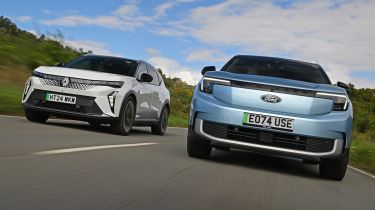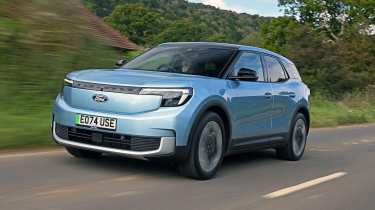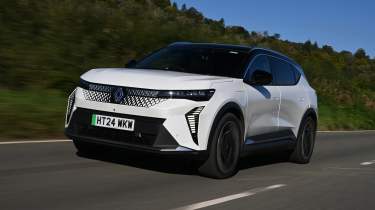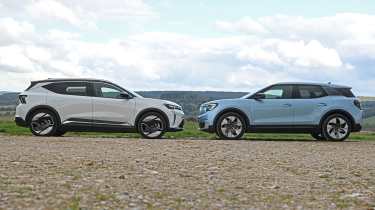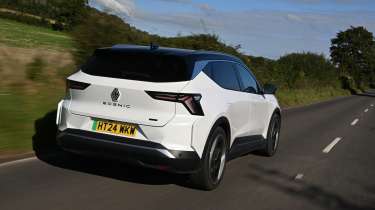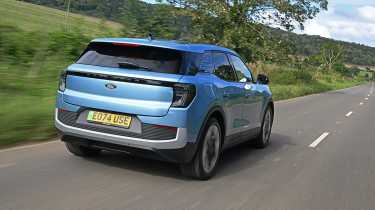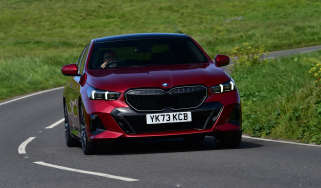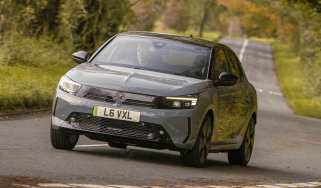Ford Explorer vs Renault Scenic: we find the superior electric family SUV
Ford and Renault lead the way when using old names for new cars. How do the electric Explorer and Scenic SUVs compare?
Established car makers are facing a challenge in the shape of new Chinese EVs, so in an effort to stand out, many are looking to connect to customers by using model names from their back catalogues.
Ford has been a dab hand at it in recent years, with cars such as the Kuga (nee Cougar) and Puma borrowing names from the past. More recently, and controversially, the Mustang and Capri sports car names have been used for electric SUVs, while the car we’re testing here, the Explorer, revives an SUV badge that we haven’t seen in Europe since the mid-nineties.
Another firm that’s relying on badge association to help further its electric car strategy is Renault. We’ve already seen the Mégane hatch transformed into an electric crossover, while that car’s E-Tech running gear is also used by the Scenic, which was launched earlier this year. However, while past incarnations of the Scenic were MPVs, the new one embraces the compact electric SUV formula.
We’re fans of the new Scenic, with its sharp design and clever cabin touches, and over the summer it has already seen off a challenger in the form of the Hyundai Ioniq 5. The margins between the Renault and Ford are arguably even closer, though, so the new Explorer will need to be pretty special to overcome the Scenic.
Ford Explorer
| Model: | Ford Explorer 77kWh Extended Range Select |
| Price: | £45,875 |
| Powertrain: | 1x e-motor, 77kWh battery, 282bhp |
| 0-62mph: | 6.4 seconds |
| Test efficiency: | 3.7 miles/kWh |
| Official range: | 374 miles |
| Annual VED: | £0 |
Trying to stand out in the busy electric compact SUV market is no easy task, but the Ford Explorer manages it. The smooth front and rear ends, squared-off lines and small windows combine to give it a purposeful look, one that’s backed up by tried-and-tested VW-derived running gear.
The range is simple at the moment, with Select and Premium trims on offer, and only minimal differences in specification between them. The sole battery option is the Extended Range – the cheaper Standard Range with a 52kWh pack arrives in early 2025. Extended Range cars have a 77kWh battery, unless you choose the more powerful four-wheel-drive car, which adds a 79kWh pack.
Tester's notes
Ford’s designers have given the Explorer a distinctive look with its smooth nose and matching rear end. It’s a clean-sheet design that doesn’t refer back to any past models, while the car’s wide stance and squared-off shape helps it fit the SUV brief.
The windows look like they’re on the small side, but there’s some clever tech going on with them to help boost all-round visibility and the sense of space inside. The mirror-finished graphic on the C-pillars is etched into the glass and looks transparent from within the cabin.
Renault Scenic
| Model: | Renault Scenic 220hp Long Range Iconic |
| Price: | £45,495 |
| Powertrain: | 1x e-motor, 87kWh battery, 215bhp |
| 0-62mph: | 7.9 seconds |
| Test efficiency: | 3.4 miles/kWh |
| Official range: | 369 miles |
| Annual VED: | £0 |
The Renault Scenic E-Tech (to give the car its full name) is one of six SUVs now offered by the French firm, but it’s the only one with an all-electric powertrain. It shares its running gear with the Megane E-Tech, but is larger overall and its SUV-style body provides a more versatile, family-friendly interior.
There are two battery options available, 60kWh and 87kWh, while Techno, Esprit Alpine and Iconic trim levels are offered, although only Techno can be had with the smaller battery. Either way, competitive pricing and generous equipment mean the Scenic offers good value for money when compared with its rivals, even in top-spec Iconic guise.
Tester's notes
It’s compulsory for all new cars to feature electronic safety systems that reset to ‘on’ every time you climb aboard, and one of the most annoying can be the road-sign detection. One of the big tests for manufacturers these days is how easy it is to deactivate systems you feel are excessively intrusive, with their assorted warning beeps. In the Scenic this is simple, because a button to the right of the steering wheel (below) deactivates the warning beeps, but still shows signs on the dash.
Head-to-head
Performance
The Ford wins the drag race between these two. There’s 282bhp on tap, while traction is strong thanks to the rear-drive layout, resulting in a 0-62mph time of 6.4 seconds.
The Scenic’s 215bhp output is modest in comparison, while front-wheel drive sees the car torque steer a little and scrabble for grip. A 0-62mph time of 7.9 seconds will be enough for most needs, though. The Ford wins the drag race between these two. There’s 282bhp on tap, while traction is strong thanks to the rear-drive layout, resulting in a 0-62mph time of 6.4 seconds.
On the road
Both cars are heavy, but the Scenic’s kerbweight dips below the two-tonne mark. The Renault has a firmer suspension set-up, so it doesn’t roll as much as the Ford in corners, but it’s also less fidgety at urban speeds.
The Explorer delivers more comfort and refinement the faster you go, while the well weighted controls mean it also feels more enjoyable to drive overall.
Price and running
There are zero per cent finance deals available on both cars, but while the Scenic has lower monthly payments, you need to find a bigger deposit and lump sum to keep the car.
Everyday costs edge into the Ford’s favour. On test we managed 3.7 miles per kWh in it, compared with 3.4mi/kWh for the Renault, although the Scenic’s larger usable battery means ranges are similar.
Practicality
Against the tape the Ford and Renault are very similar in size. The Explorer is better for head and elbow room in the back, but both cars have high floors and shallow rear seat bases, so aren’t the most comfortable.
The Renault’s boot has a higher load lip, but there’s more space overall, including a large under-floor storage area. Neither car has any space under the bonnet.
Safety
The Scenic tested here is in top-spec Iconic trim, and comes with all of the safety kit you could wish for, including a smooth lane-assist system and blind-spot detection.
You need to add the £1,800 Driver Assistance Pack to the Explorer for blind-spot detection, but this also adds a head-up display, powered tailgate, lane-change assist and a 360-degree camera system.
Ownership
Maintenance costs for EVs are cheaper because there are fewer moving parts to maintain, and the Scenic has a 36-month service plan that costs £10.99 a month – in comparison, the same cover for a Clio is £13.99.
Better than that, the Explorer comes with five years of complimentary maintenance, although with 24-month intervals, that just covers two services.
Verdict
First place: Renault Scenic E-Tech
These two cars are the front runners in the compact electric SUV class. In terms of ability, both have strong points that are countered by minor niggles. The Scenic has decent space inside, a big boot and a long list of kit, which are strengths that outweigh the negatives of poor rear visibility, a fidgety ride and a relative lack of power next to the Explorer.
When it comes to pricing, the Scenic narrowly edges ahead. This top-spec model isn’t left wanting for kit, while the inclusion of a heat pump seals a narrow victory for Renault.
Second place: Ford Explorer
Picking between these may well come down to personal taste, the margins are so small. The Explorer has strong suits, with a spacious cabin that offers an SUV-like driving position, plenty of storage, a responsive powertrain and a tempting after-sales package.
There’s not as much boot space as in the Scenic, while the movable touchscreen is a bit of a gimmick, and we’d like to see a heat pump included, but overall the Explorer is a strong contender. While it comes second here, we’d pick the Ford over VW’s MEB-based SUVs.
Prices and specs
| Ford Explorer | Renault Scenic | |
| Our choice | 77kWh Extended Range Select | 220hp Long Range Iconic |
| Price from/price of our choice | £39,875/£45,875 | £37,495/£45,495 |
| Powertrain and performance | ||
| Powertrain | 1x electric motor | 1x electric motor |
| Power | 282bhp | 215bhp |
| Torque | 545Nm | 300Nm |
| Transmission | Single-speed/rwd | Single-speed/fwd |
| 0-62mph/top speed | 6.4 seconds/112mph | 7.9 seconds/106mph |
| Battery capacity/usable | 82/77kWh | 87/87kWh |
| Test efficiency | 3.7mi/kWh | 3.4mi/kWh |
| Official range | 374 miles | 369 miles |
| Charging | 135kW (10-80% in 28 mins) | 150kW (15-80% in 37 mins) |
| Dimensions | ||
| Length/wheelbase | 4,468/2,767mm | 4,470/2,785mm |
| Width/height | 1,871/1,630mm | 1,864/1,571mm |
| Rear kneeroom | 640-865mm | 636-890mm |
| Rear headroom/width | 985/1,490mm | 955/1,435mm |
| Boot space (seats up/down) | 450/1,422 litres | 545/1,670 litres |
| Boot length/width | 820/1,050mm | 860/960mm |
| Boot lip height | 720mm | 780mm |
| Kerbweight/payload/towing weight | 2,090/585/1,000kg | 1,918/523/1,100kg |
| Turning circle | 10.8 metres | 10.9 metres |
| Costs/ownership | ||
| Residual value (after 3yrs/36,000, via CDL) | £20,667/51.8% | £19,647/52.4% |
| Depreciation | £19,208 | £17,848 |
| Insurance group/quote (from AA.com)/VED | 28/£916/£0 | 32/£858/£0 |
| Three-year service cost | £0 (5yr plan, 2 services) | £396 (£10.99p/m) |
| Annual tax liability std/higher rate | £183/£367 | £182/£364 |
| Annual electricity cost (12k miles) | £795 | £865 |
| Basic warranty (miles)/recovery | 3yrs (60,000)/1yr | 3yrs (60,000)/3yrs |
| Driver Power manufacturer position | 30th/32 | 28th/32 |
| NCAP Adult/child/ped./assist/stars | 89/86/80/72/5 (2024) | 88/89/77/85/5 (2022) |
| Equipment | ||
| Metallic paint/wheel size | £800/19 inches | Yes/20 inches |
| Parking sensors/camera | Front & rear/rear | Front & rear/360 degrees |
| Spare wheel/Isofix points | Repair kit/two | Repair kit/two |
| Keyless entry & go/powered tailgate | Yes/£1,800 pack | Yes/yes |
| Leather/heated seats | Part fake/yes | No/yes |
| Screen size/digital dash size | 14.6 inches/5.3 inches | 12 inches/12.3 inches |
| Climate control/panoramic sunroof | Two-zone/no | Two-zone/yes |
| USBs/wireless charging | Four/yes | Four/yes |
| Wireless CarPlay/Android Auto | Yes/yes | Yes/yes |
| Blind-spot warning/head-up display | £1,800 pack/£1,800 pack | Yes/no |
| Adaptive cruise/heat pump | Yes/£1,050 | Yes/yes |
What we would choose
Renault Scenic
The only option that can be added to any version of the Scenic is two-tone paint – even single-colour metallic comes as standard. Esprit Alpine is the only model that can be had with a matt grey finish, though.
Ford Explorer
Ford The £1,050 heat pump is useful if you’re unable to precondition the Explorer on cold days and want to maximise range. But if you’re only using the car for shorter journeys there should be enough between charges.

